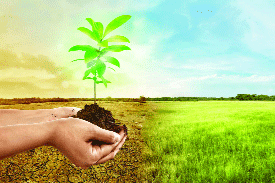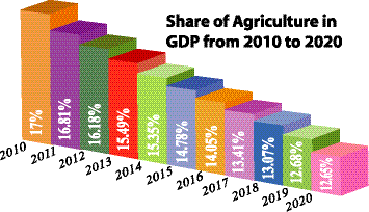BD agriculture may be jeopardised in 25-yrs
Agri-contribution in GDP
declining 0.5 pc every year
Mahfuja Mukul:The contribution of agriculture sector to Bangladesh GDP is declining day by day due to the less interest in agriculture by the marginal farmers. The main reason behind the declining of interest in agriculture is the price disparity and less marketing facility.
The contribution of agriculture in Bangladesh GDP has declined by 4.35 percent in a period of only decade.
Agriculture sector’s contribution in GDP was 17 percent in 2010 which has declined to 12.65 percent in 2020. It proves that the agriculture is declining almost 0.5 percent every year in Bangladesh. If the trends continued; Bangladesh would lose it historical agriculture within next 25 years.
The agro-processing and subsidiary sectors are also losing importance, which is increasing dependency on foreign processed food and synthetic foods.
Agro-processing industry is still lagging behind despite an increase in agricultural production, noted experts.
Total production in the agricultural sector has increased six times although its contribution to the country’s Gross Domestic Product (GDP) has declined. However, there is scope for a significant increase in agricultural exports if agro-products can be processed industrially, they said at a seminar on “Bangabandhu’s dream: Transformation of agro-based economy” held recently.
As chief guest, Agriculture Minister Muhammad Abdur Razzaque said the incumbent government has made remarkable achievements in agricultural production. But the transformation of an agro-based economy will not take place if agriculture cannot be industrialised through advancement in processing and adding value to the products.
“The market for agricultural products needs to be tapped and expanded locally and internationally. For this, the agriculture sector needs to increase its relationship with industrialisation,” he added.
Planning Minister MA Mannan presided over the seminar organised by the planning division at the National Economic Council (NEC) conference room in Sher-e-Bangla Nagar, Dhaka.
Fisheries and Livestock Minister SM Rezaul Karim said many countries are earning foreign exchange exporting seaweed and there is also high demand for tuna fish all over the world.
“We also have the opportunity to tap that export potential. The government has taken several initiatives for deep sea tuna fishing,” he said.
“Farmers here have already started farming eels and crabs commercially as there is a demand for eels and crabs in a number of countries, including China,” he added.
According to the keynote paper, the agro-processing industry is evolving and is in the process of transforming the agro-based economy. However, exports are moving at a very slow pace.
In financial year 2019-20, the export of agricultural products was $1,061 million, which was $1,052 million in the 2018-19 fiscal year.
Minister hopeful
Razzaque says the country has shown remarkable progress in the agriculture sector in the last 50 years
Agriculture Minister Dr Mohammad Abdur Razzaque on Thursday urged people to invest more in the agriculture sector as it is playing an important role in reducing poverty across the country.
“The agriculture sector is one of the key drivers of the growth for the economy of Bangladesh. The GDP stood at around 13 percent in FY21 due to the contribution of the agricultural sector to the economy.
The minister urged entrepreneurs to specifically invest more in the agro-processing sector and encouraged them to market the products internationally so that Bangladesh can benefit from higher export earnings.
Razzaque also said the country has shown remarkable progress in the agriculture sector in the last 50 years.
“Now more than 60% of the land is being used to cultivate various types of crops, ensuring our food security,” he added.”We should try to get our agri-products into chain stores like Walmart and other similar places,” he further said.
Notable experts from the agricultural sector also urged the government to allocate at least 10% of the budget to agricultural research and innovation.
The government has allocated Tk3,020 crore in subsidies for a five-year farm mechanization program, however in reality, a little over Tk200 crore has been channelled in the first year of the program.
Future of five decades
What might happen to agriculture depends on several factors outside agriculture. The first is population and income changes. Both will impact the total demand for food as well as its structure. BBS projections for population extend up to 2061 with a range from roughly 210 million to 250 million, with an average number of 223 million.
If nothing else changes, the demand for food may rise roughly by nearly 50 percent or so taking the average projections. However, income changes will also take place. Just before the pandemic, per capita GDP had been rising at a rate of more or less 8 percent per annum. That means the per capita GDP had been rising at more or less 6 percent per annum.
That means if the momentum persists, Bangladesh would have doubled per capita GDP in roughly 12 years i.e., right after 2030.
All the sectors, agriculture, particularly crop agriculture, was the least adversely affected due to boro harvest. But vegetables and fruits output, though not lost, could not be marketed due to supply chain disruptions causing substantial losses to farmers.
Far more severe were the losses in poultry farming as well as milk production. Aquaculture probably suffered lower losses. As the supply chains got back to normal, these have basically revived again.
So, in the short to medium run, agriculture, many think, may be the exit strategy from the present economic dislocation. However, for this to happen, the supply chain issues, ensuring fair prices to farmers, and marketing infrastructures have to be modernised with proper storage facilities including cold chain development for perishables and modern vehicular system for proper transport to minimise wastage. To support such development, government intervention, for appropriate technology and financing policies both at point of origin and destination, is needed. Increasingly, the supermarkets, particularly in large urban centres, are playing a major role in acting as catalysts and getting access to technology points as has happened in many countries. I earlier pointed to the issue of mechanised harvesting which needs to be very carefully considered and appropriate actions implemented. Hasty introduction of machines replacing millions of agricultural manual labourers at one stroke will create more social problems and unrest than solving them.
Even within the present food system, there are high nutritional imbalances. Stunting, underweight, wasting, micronutrient deficiency is still high and fears are palpable that the pandemic may create more of wasting, jeopardising productivity in the future economy and thus curtailing the growth rate.
Rare Israeli airstrike in Beirut kills Hezbollah commander and more than a dozen others
International Desk: Israel launched a rare airstrike that killed a senior Hezbollah milita…









